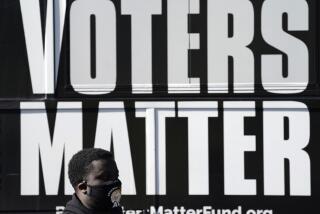Low turnout, not Obamacare, poses chief threat, Democrats say
- Share via
WASHINGTON – Following their loss in Tuesday’s special congressional election in Florida, Democratic strategists increasingly are willing to say publicly that the party faces a problem in this year’s midterm election – but it’s not necessarily the one you’d think of.
Not Obamacare, Democrats argue. Republicans may point to the president’s healthcare law as the centerpiece of their election strategy, the subject which the vast majority of their television ads in the Florida race talked about, but Democrats deny that’s the key.
“Any fair assessment about the role that debate of the Affordable Care Act played” in the Florida election “reaches the conclusion that at best for the Republicans it was a draw,” White House spokesman Jay Carney said Wednesday.
In fact, some outside evidence supports that view – at least up to a point. A new NBC/Wall Street Journal poll, released Wednesday, for example, asked voters whether they would prefer a Democrat who wants to fix the healthcare law or a Republican who wants to repeal it. The result was a near-even split, with 48% supporting the Democrat and 47% the Republican.
That poll mirrors one which Democratic pollster Geoffrey Garin conducted for Alex Sink, his party’s candidate in the Florida race. Voters there preferred Sink’s “fix-it” position over the “repeal it” stance of her opponent, Republican David Jolly, and the debate helped her among independents, Garin said in a memo after the voting.
The problem for Democrats, however, is that Republicans don’t have to persuade a majority of voters about their position on the healthcare law. They only have to convince the people on their side of the argument to show up and vote. Motivating conservative voters to cast ballots has been the main focus of the GOP electoral strategy, and, so far, they appear to be succeeding.
The healthcare law “was a motivating issue for Republicans to come out and vote, and less so for Democrats,” Garin told reporters Wednesday.
And that – how to motivate their voters – is the problem that Democrats are openly discussing.
“In the midterms, Democrats too often don’t vote. Too often, when there’s not a presidential election, we don’t think it’s sexy, we don’t think it’s interesting,” President Obama said last week at a fundraising event. “People tune out. And because the electorate has changed, we get walloped.”
Indeed, in 2012, when Obama barely carried Florida’s 13th Congressional District, the district-wide turnout was 329,347. Tuesday night’s special election turnout fell just short of 184,000, with some late-arriving mail-in ballots yet to count. The fall-off came disproportionately from Democratic-leaning voters.
Another set of numbers from the NBC/Wall Street Journal poll underscores the problem. Overall, voters so far express less interest in this fall’s election than they did in the last two midterm contests, in 2006 and 2010. But Republicans (55%) are far more likely to express high interest than are Democrats (43%).
The gap does not yawn quite as large as it did at this point in 2010, when Republicans scored major victories, but, just as was true four years ago, one-sided intensity threatens Democrats with more defeats.
Twitter: @DavidLauter
More to Read
Sign up for Essential California
The most important California stories and recommendations in your inbox every morning.
You may occasionally receive promotional content from the Los Angeles Times.











